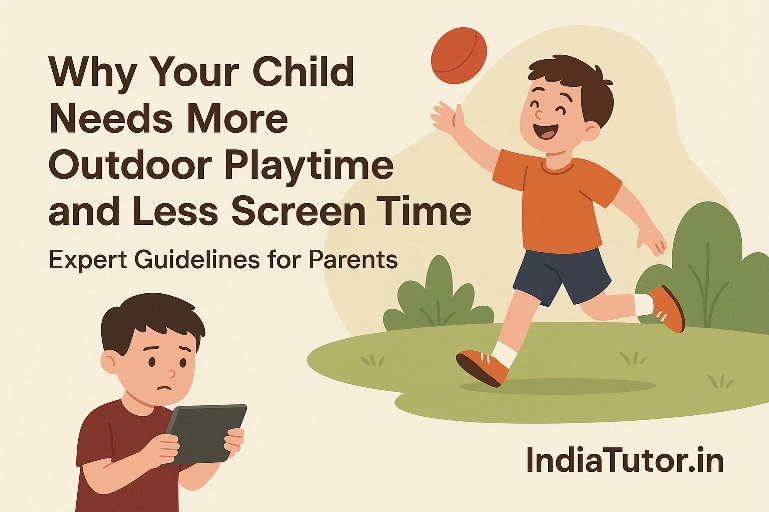As parents, we all want our children to grow up healthy, happy, and well-rounded. In today’s digital age, however, many kids are spending more time indoors glued to screens than outside playing in the fresh air. Whether it’s watching videos, scrolling through social media, or playing online games, the lure of screens is strong. While technology has its benefits, too much screen time can affect a child’s physical health, emotional well-being, and even academic performance. Encouraging more outdoor playtime is one of the best ways to restore balance in a child’s daily routine.
A report by the World Health Organization (WHO) recommends that children aged 5 to 17 engage in at least 60 minutes of moderate to vigorous physical activity every day. Yet, according to a 2023 study by Common Sense Media, children in India spend an average of over 4 hours a day on screens outside of schoolwork, with outdoor play often limited to less than 30 minutes. This gap is a cause for concern.
Outdoor play offers benefits that screens simply cannot match. First and foremost, it promotes better physical health. Running, jumping, cycling, and playing outdoor games help build strong muscles and bones, improve coordination, and maintain a healthy weight. In contrast, prolonged screen time often leads to a sedentary lifestyle, increasing the risk of obesity and related health issues such as poor posture and eye strain.
Outdoor activities also play a crucial role in mental well-being. Being in natural environments reduces stress and anxiety, boosts mood, and enhances creativity. Studies have shown that children who spend more time outdoors tend to have better problem-solving skills and higher levels of curiosity. For example, research from the University of Illinois found that children with Attention Deficit Hyperactivity Disorder (ADHD) showed improved focus and reduced symptoms after spending time in green spaces.
Another important aspect of outdoor play is social development. When children play outside, they interact with peers in real-world settings, learning to cooperate, share, and resolve conflicts. These experiences help build communication skills and emotional intelligence, which are essential for success later in life. Screen-based activities, on the other hand, often limit face-to-face interaction and can contribute to feelings of isolation.
Outdoor play also supports healthy sleep patterns. The natural light exposure from being outside helps regulate a child’s circadian rhythm, making it easier for them to fall asleep and wake up on time. Excessive screen time, particularly before bedtime, has been linked to sleep disturbances because the blue light from devices can interfere with melatonin production, the hormone that regulates sleep.
Reducing screen time and increasing outdoor play requires conscious effort from parents. Start by setting clear screen time limits based on your child’s age. For younger children under 6, limit recreational screen time to no more than an hour a day. For older children, aim for two hours or less outside of schoolwork. Instead of banning screens entirely, focus on creating a balanced routine where digital use coexists with physical activity.
You can encourage outdoor play by making it appealing and accessible. Plan family activities such as nature walks, cycling trips, or visits to the park. Organize play dates with friends to make outdoor time more social and enjoyable. If space allows, set up a small play area in your backyard or terrace with simple games and sports equipment. Even small changes, like walking to school or playing outside after homework, can make a big difference over time.
It is also important to be a role model. Children are more likely to enjoy outdoor activities if they see their parents participating. Try joining them for a game of cricket, badminton, or even a simple game of catch. When outdoor play becomes a shared family habit, it naturally becomes a priority in your child’s life.
The key is not to demonise screens entirely but to help children understand the value of balance. Technology can be a useful learning tool, but it should not replace the physical, emotional, and social benefits of real-world play. By making outdoor activities fun, varied, and a regular part of daily life, we can help children grow into healthier, happier, and more resilient individuals.
In the long run, children who spend more time outdoors are likely to have stronger bodies, sharper minds, and better social skills. The lessons they learn on the playground, the joy of running freely, and the curiosity sparked by exploring nature will stay with them far longer than the latest online trend. As parents and educators, we have the responsibility to ensure our children get the best of both worlds, with more sunshine and fresh air, and less screen glare.
By Nidhi Mehta – Founder – IndiaTutor.in
🔥 Post Engagement
👁️ 11 Total Views
🔥 2 Views Today
📈 11 Views Last 7 Days
Share:
WhatsApp | Facebook | Twitter | LinkedIn
To share your Feedback or Review – Contact Us
Are you a Tutor? Register your Tutor profile on India Tutor to connect with Students in India and Abroad.
Are you a Parent or Student? – Submit Tutor Wanted Form to reach relevant tutors registered on IndiaTutor.in.
Do you own a Tuition Center? Want to connect with students in your local area? List your center with us.
Free Online Self Evaluation Tests for Tutors and Students
Read our Reviews Have Questions? Read FAQs

